If we were ever asked, we would all have a difficult time determining the perfect number of working hours per week.
For most of us, our working hours are a combination of factors, including personal choice and the demands of our jobs. However, there is one important factor that you may not have thought about: how many hours do we actually need to work?
What is a Normal Workweek?
In most countries, the average working week is somewhere around 40 hours, mostly clocking in at 09:00 a.m. in the morning and wrapping the workday around 05:00 p.m. . In some countries, it's much less; in others, it can be more than 50 hours a week.
But do we really work for solid 40 hours or is that the amount of time we are present in the office? I'm guessing it's the second one.
It's no wonder that employees accomplish far less than the timetable suggests. This is due to the fact that the vast majority of us are unable to maintain our productivity levels for an entire eight-hour workday.
How Many Hours Is A 7 Day Week?
A 7-day week consists of 168 hours. This is because there are 24 hours in a day, and when you multiply 24 by 7, you get the total number of hours in a week.
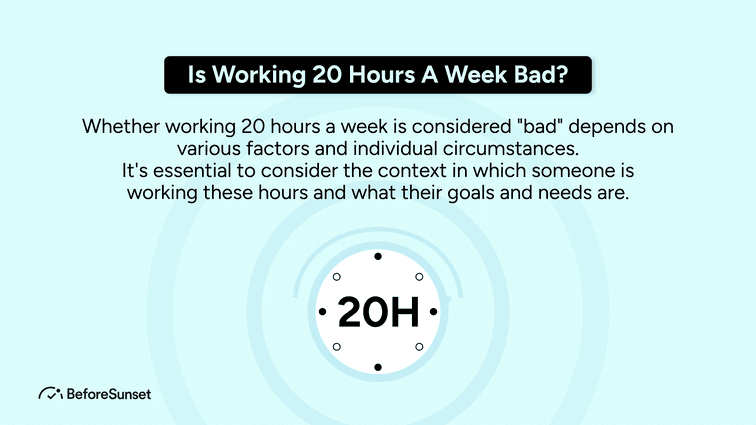
Is Working 20 Hours A Week Bad?
Working 20 hours a week is not necessarily terrible; in fact, it may be the best option for some people and situations. Working 20 hours per week is acceptable or not depending on several conditions, including:
Part-Time Employment: Many employers offer part-time opportunities, which often require workers to put in fewer than the typical full-time workweek's 40 hours. For people who are in school, retired, have other responsibilities, or are looking for work-life balance, part-time work may be the best option.
Financial Situation: It could be a possibility if a person's requirements can be covered with a 20-hour workweek or by combining several part-time employment.
Career Objectives: Some people may decide to work less hours in order to prioritize their own interests, hobbies, or other activities while still holding down a part-time job to support themselves.
Health and wellbeing: For those who have stress or health problems, cutting back on work hours might help them better manage their wellbeing.
Flexible Work Arrangements: Some professions and industries provide employees with flexible work arrangements that enable them to work less hours while still having a significant impact on their businesses.
The financial ramifications must also be taken into account, as well as if a 20-hour workday generates enough revenue to cover one's commitments and requirements. Working part-time could also prevent you from receiving some benefits, like health insurance or retirement plans, that come with full-time employment.
The viability of a 20-hour workday ultimately relies on the circumstances, choices, and financial factors of each individual. To decide how many hours to work each week, one must carefully consider their goals, financial condition, and preferences for a work-life balance.
Is Working 60 Hours A Week Healthy?
Regularly working 60 hours a week is typically not seen as healthy and can have detrimental effects on both physical and mental health. While occasionally putting in long hours to meet deadlines or deal with pressing situations may be important, doing so on a regular basis can have various negative effects on your health.
Burnout: A condition of extreme physical, emotional, and mental tiredness, is brought on by extended periods of overworking. Burnout can lead to decreased productivity, more mistakes, and a decline in enthusiasm in one's job.
Physical Health: Not getting enough rest and recuperation time can cause weariness, sleep disruptions, an increased risk of developing chronic illnesses including heart disease, and weaker immune system.
Mental Health: Working long hours might increase stress, anxiety, and depressive symptoms. Additionally, it may have an impact on cognition, memory, and judgment.
Work-Life Balance: Due to the long hours spent at work, there is little time left over for personal, recreational, familial, and social pursuits, creating a substantial imbalance in one's priorities.
Relationships: Due to a lack of time spent together and heightened emotional tiredness, working too much can disrupt relationships with family and friends.
Productivity: Contrarily, working overly long hours can reduce productivity since the quality of the job declines and the likelihood of mistakes rises.
Is Working 70 Hours A Week Too Much?
It is undeniably excessive to work 70 hours a week, since it might negatively impact one's physical and emotional health. Working for extended periods of time might make you tired, stressed out, and more likely to burn out. In addition to the direct effects on health, it frequently leads to strained relationships, a worsened work-life balance, and decreased general contentment.
As weariness sets in, productivity tends to decrease and creativity may be hindered. Healthy and sustainable work habits are essential for both personal enjoyment and long-term success. Maintaining a healthy balance between work and personal obligations is crucial for optimum productivity, overall wellbeing, and a more fulfilling and long-lasting career path.
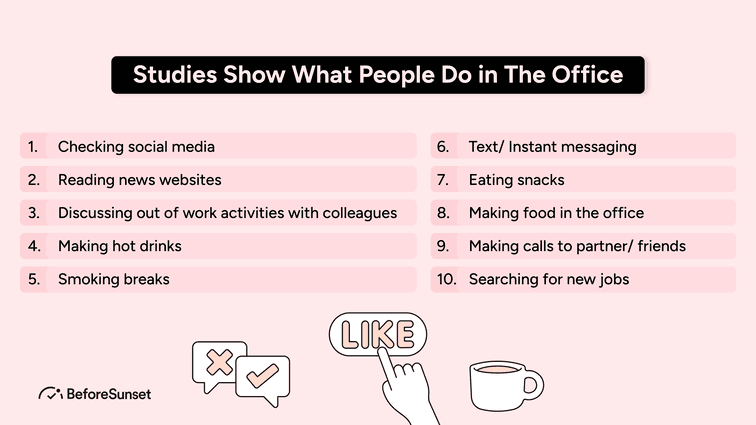
Studies Show What People Do in The Office
Vouchercloud polled 1,989 UK office workers as part of a study investigating the online habits and productivity of workers across the country. 'If you had to put a number on it, how much time do you think you spend productively working during work hours on a daily basis?' the study asked. The average response was '2 hours and 53 minutes’ of actual office productivity across all responders.
That's right, you're probably only productive for around three hours a day. The survey then looked at what people did instead of working:
Checking social media
Reading news websites
Discussing out of work activities with colleagues
Making hot drinks
Smoking breaks
Text/ Instant messaging
Eating snacks
Making food in the office
Making calls to partner/ friends
Searching for new jobs
This raises a slew of questions. Why do so many businesses insist on an eight-hour workday when employees can't be productive for the entire time? What are the dangers of forcing our brains to follow that schedule? And, really, how many hours should you be working per week?
The Origin of the Standard: 40 Hours Work Week
The current 8-hour workday, which is what most businesses and jobs conform to, was neither created in response to human behavior and needs nor was it based on the optimal number of hours a human can concentrate.
In fact, it was pioneered in the Industrial Revolution, when people had to work for 10-16 hours so that the factories could run 24/7. Yep! You’ve heard it right: What once was a dream has become a nightmare.
In 1817, Robert Owen advocated for shorter workdays with his slogan “Eight hours labor, eight hours recreation, eight hours rest.” Nearly a century later, the eight-hour workday became the norm when Ford Motor Company changed its company policies and stunned the world by lowering it to eight hours while simultaneously doubling earnings in 1914. The end result was increased productivity.
However, it wasn't until the Fair Labor Standards Act of 1938, which made the work week 44 hours long. Later, Congress further limited the workweek to 40 hours.
However, in the last few decades, many of us have experienced a surge in working hours. In fact, according to a report by the New York Times, “The average workweek for a salaried employee in the United States is now 47 hours, up from about 39 hours in 1980.”
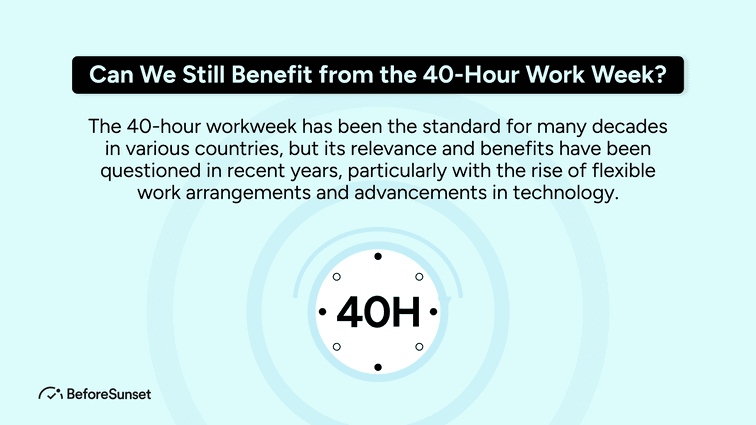
Can We Still Benefit from the 40-Hour Work Week?
We are no longer living in the Industrial Revolution when an 8-hour shift was the norm. Thanks to the digital and information revolution, we now have tools that can make practically every type of production in almost any industry more efficient than it was previously.
Long story short, we get work done faster. The issue is not with the employee, but with the anachronistic need of working for 8 hours a day.
According to Malissa Clark, a psychologist at the University of Georgia who studies employee well-being and workaholism, concentrating on work for every minute of an eight-hour day is "impossible" for humans. We may spend more than eight hours at our desks, but we are not working for eight hours. That means we spend hundreds of hours a year, if not thousands, of our lives "playing pretend."
Parkinson’s Law suggests that “Work expands so as to fill the time available for its completion.” This saying has been proven accurate time and time again in a variety of businesses throughout the world. Arguing for a regular workweek of less than 40 hours feels almost heretical in the age of hustle culture. But, if eight hours isn't always what managers want from office workers—and it's certainly not what the majority of people do—what should we be doing instead?
What Does It Mean When You Overwork?
Overworking refers to pushing yourself to put in overly long hours of labor, frequently beyond what is fair or healthy. Consistently putting in long hours at work while ignoring the need for adequate rest and downtime is involved.
Overwork can result in mental and physical tiredness, elevated stress levels, and decreased productivity. Your general health may suffer, which might result in burnout, broken relationships, and an imbalance between your personal and professional lives.
Overworking may not always lead to better performance and may even be detrimental to your health and happiness in your job. Maintaining a healthy and sustainable attitude to work, which promotes improved general health and happiness, requires striking a balance between work and personal life.
Am I Overworked or Just Lazy?
Self-reflection and a greater comprehension of your work habits and emotions are necessary to distinguish between being overworked and simply being lazy. It's more probable that you are overworked if you frequently work long hours, feel weary, and experience stress or burnout.
Overworking can cause stress on your body and mind, which will be harmful to your general wellbeing. On the other hand, if you routinely put things off, lack the will to do them, and shirk obligations without good cause, it could be a sign of laziness.
However, it's important to refrain from self-criticism and instead take into account other influences that could be affecting your behavior. To determine if changes are necessary to establish a healthy work-life balance or if you need to address any motivational or behavioral difficulties, consider your workload, work environment, and personal life. A mentor, therapist, or trusted friend may offer insightful advice that will help you comprehend and handle any issues you may be dealing with.
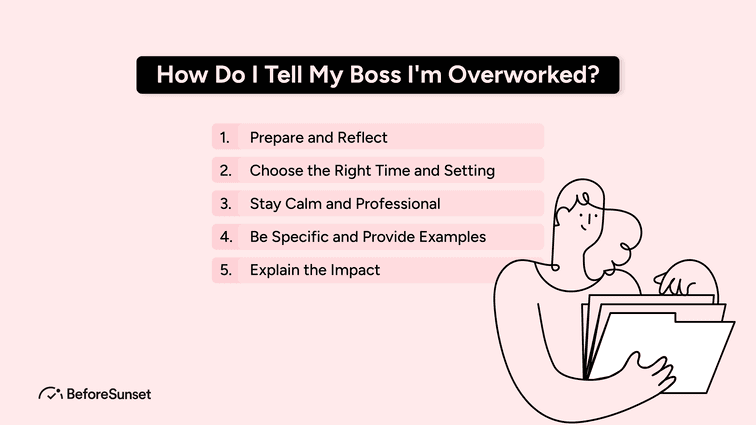
How Do I Tell My Boss I'm Overworked?
It's important to handle the topic professionally and positively when bringing up your overwork with your manager. To ensure a concentrated conversation, ask your manager for a private meeting.
Express your appreciation for the chances, but respectfully admit that the workload and short deadlines have left you feeling overwhelmed. Give concrete instances to support your argument and to show how it affects your productivity and wellbeing.
Offer suggested remedies, such assigning jobs to others or rearranging your priorities, in order to establish a better work-life balance. Stress your dedication to the position and desire to continue delivering top-notch work.
A constructive and understanding dialogue that can result in significant improvements will be facilitated by demonstrating willingness to working together to discover answers.
What Does Burnout Feel Like?
Burnout is a state of physical, emotional, and mental exhaustion that results from prolonged and intense stress, particularly related to work or caregiving responsibilities. Burnout can manifest differently in individuals, but some common feelings and symptoms associated with burnout include:
Emotional Exhaustion: Feeling emotionally drained and unable to cope with the demands of work or life. You may experience a lack of motivation, disengagement, and a sense of emotional detachment.
Physical Symptoms: Burnout can lead to physical symptoms such as headaches, stomachaches, fatigue, and increased susceptibility to illnesses due to a weakened immune system.
Reduced Performance: You may notice a decline in your job performance or struggle to concentrate and complete tasks effectively.
Cynicism and Negativity: Developing a negative and cynical outlook towards work, colleagues, or life in general. You may find it challenging to see the positive aspects of your job or situation.
Lack of Satisfaction: Feeling unfulfilled or unsatisfied with your accomplishments, even when you achieve significant milestones.
Withdrawal from Responsibilities: Avoiding or distancing yourself from work or social commitments and preferring isolation.
Increased Irritability: Becoming easily irritated or frustrated by minor things that wouldn't typically bother you.
Sleep Problems: Difficulties falling asleep, staying asleep, or experiencing restless sleep due to constant rumination and stress.
Loss of Interest: Losing interest in activities you once enjoyed, both in and outside of work.
Feeling Helpless: Feeling like you have no control over your work or personal life, leading to a sense of helplessness and hopelessness.
Anxiety and Depression: Burnout can contribute to the development of anxiety and depression, with feelings of sadness and anxiety becoming more prominent.
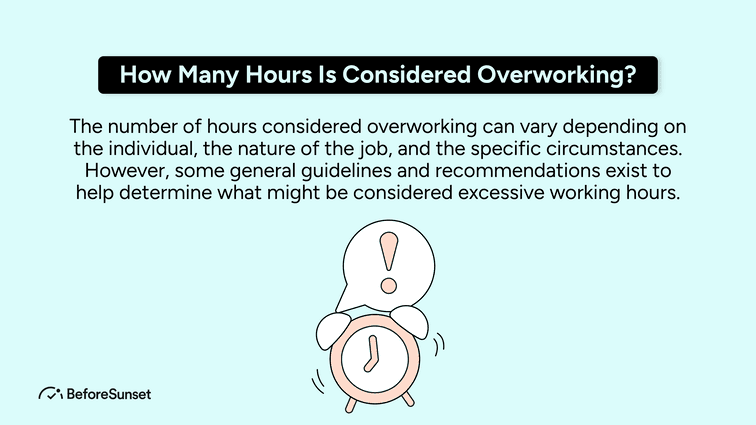
How Many Hours Is Considered Overworking?
The amount of time that is deemed excessive working might vary based on things like labor regulations, industry standards, personal health, and work-life balance. A typical full-time workweek lasts around 40 hours in many nations.
As a result, continuously working a great deal more than this cutoff point—for example, routinely surpassing 50 to 60 hours per week—is often seen as overworking. However, the definition of overworking also considers how much time is spent working and how it affects a person's physical and mental health. Burnout, elevated stress, decreased productivity, and a number of health problems can result from overworking.
To preserve general health and job effectiveness, a sustainable balance between work and personal life is vital.
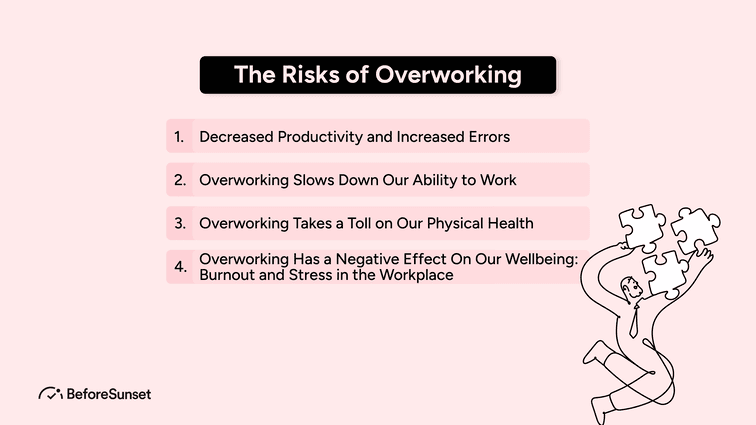
The Risks of Overworking
Working too much puts one's physical, mental, and general well-being at serious danger. Long stretches of excessive working hours can cause physical tiredness, chronic fatigue, and sleep problems, which impair the body's capacity to heal and perform at its best.
Overworking can result in increased stress and strain, which can lead to mental health problems including anxiety and depression, as well as increased irritability and impaired cognitive function.
Burnout, which is characterized by emotional detachment, decreased job satisfaction, and a deterioration in job performance, is also significantly influenced by overworking. Social isolation and tense family dynamics can result from putting work before personal relationships and life. Long-term overworking may also hinder professional advancement and raise the chance of mistakes and accidents since it impairs judgment and focus.
Recognizing the symptoms of overworking and taking proactive steps to guarantee appropriate rest, leisure time, and self-care are crucial for maintaining a healthy work-life balance and avoiding these hazards.
Working too much can have negative consequences on your health, family life, and sanity. It's easy to think that you should work more hours because it will lead to a greater sense of accomplishment and satisfaction.
But the truth is, working too much will only lead to more stress and burnout. Even when you're not at work, your mind can't rest because it's always thinking about work.
A shorter workweek, whether it's the same 40 hours compressed into four days or fewer hours overall, allows for a better balance between work and life and reduces the risks associated with overworking.
1. Decreased Productivity and Increased Errors
Maybe you're one of those folks who brag about working 70 hours a week. Maybe you're on the opposite end of the spectrum, dreaming of a brand new technique, 4 day work week. Whatever your work appetite, keep in mind that there's plenty of evidence that working more hours per week doesn't always correspond to increased productivity.
Employees that work too much lose efficiency, which is one of the most serious consequences of overworking. Even if they are putting in many hours, the quality of their work may start to degrade over time.
Try adjusting your working schedules and reducing your working hours in the workweek so that you can enhance your productivity and the overall quality of the work.
2. Overworking Slows Down Our Ability to Work
This may be the reason why Henry Ford switched to a 40-hour work week: He realized that working longer hours didn’t necessarily guarantee being more productive. This is supported by a research done in a financial services firm in New Zealand: workers were 20% more productive after switching to a 32-hour/four-day workweek than they were during a 40-hour workweek while still being compensated the same. They were able to accomplish more in less time.
“Work smarter, not harder.” There is a reason we have been hearing this saying for decades. “First, working longer hours does not necessarily mean higher personal productivity,” say Harvard Business School researchers Robert Pozen and Kevin Downey. “Working smarter is the key to accomplishing more of your top priorities each day.”
3. Overworking Takes a Toll on Our Physical Health
There is a growing body of evidence to support how overworking puts employees and organizations at risk. According to a study published by Insurance Journal, overworking increases the risk of being injured by 61 percent, as well as the risk of having chronic diseases like diabetes, arthritis, and cancer.
You've definitely heard the statistics and warnings before: overworking has been linked to an increased risk of heart attack and stroke, and lengthy work hours have been linked to obesity.
All in all, working long hours degrades your fitness level, takes its toll on your diet, and puts stress on your mind and body. What's the end result? Poor circulation, increased weight, cardiac difficulties, higher cholesterol levels, fatigue, poor sleep, poor concentration, nervous disorders, depression, and so on.
4. Overworking Has a Negative Effect On Our Wellbeing: Burnout and Stress in the Workplace
People who work long hours are twice as likely to have a major depressive episode, according to a study, especially if they work more than 11 hours per day. And according to another research by Oxford University’s Saïd Business School, there is a link between happiness and productivity: Workers are 13% more productive when happy. Researchers discovered that happy workers do not work more hours than their discontented counterparts; rather, they are more productive during their working hours.
This simply means more time invested does not, in fact, equal better output. Employees work harder and get more done in a shorter time span when they are happy, without needing to overwork.
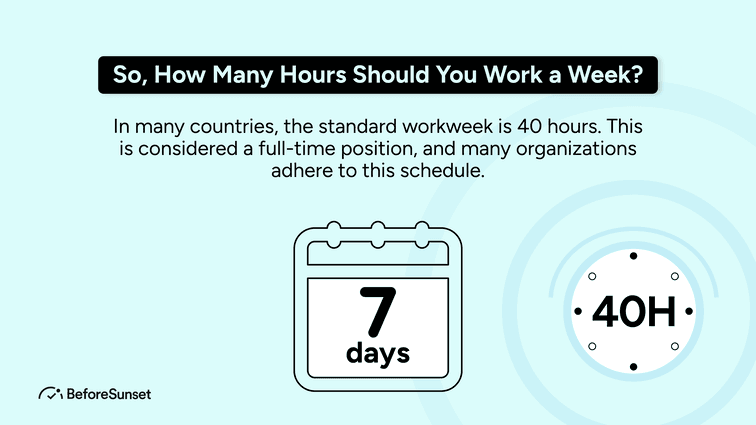
So, How Many Hours Should You Work a Week?
We have always wondered how many hours is the ideal number of hours to work per week. But there is no answer to this question as there is no one size that fits all. However, scientists generally agree that the ideal working time is around 6 hours, and more concentrated in the morning.
Employees take advantage of their most productive hours and focus on other daily activities including social, sporting, and cultural.
But, once again, there is no one size that fits all. If you want to find which alternative work schedule suits you best, you need to consider your personal responsibilities, your job responsibilities, and your employer’s willingness to be flexible.
It doesn’t matter if you have more or less time. It’s not so much about having more time but it is about knowing what to do with that time. You may be working five days a week but if you don’t know how to achieve work-life balance, you will still struggle. You need to figure out the ways that work for you to maximize your productivity while reducing your stress.
In Short:
Productivity decreases when the employees aren’t able to get everything done.
When workers are pressed for time, the quality of their work suffers.
When employees can't take time off to learn something new or develop a technique that might benefit the company, growth stalls.
Customer service suffers when employees are just concerned with making ends meet rather than developing and maintaining relationships with customers.
When people lose interest in their work, morale nosedives. They either burn out or quit their job.
Ways to Deal With Overworking Problem
When you're at work, you should feel enthusiastic, driven, and appreciated. You should have time to learn new things, develop your skills and talents, and contribute to the company's success.
Workplace culture is crucial for keeping employees motivated and satisfied. It's important to create a positive environment and encourage your employees to take control of their work.
Here are some tips on how to deal with overworking problem:
Make sure you set boundaries. For example, once you have completed your work for the day, inform your team that you will not be checking your emails or messages until the following morning. You'll be able to take advantage of your spare time to its fullest and appreciate the here and now.
Make sure you tell your manager if you're feeling overburdened or in need of a break from the long hours you're putting in.
Many people feel that they can multitask, however, this isn't true. Every time you switch from one task to another, it takes your brain a while to adjust. This means that you're not actually working more efficiently by switching between tasks and will end up taking longer to complete your work. The best way to get ahead of the game is to set aside a specific amount of time each day and dedicate it entirely to one task. This will allow you to concentrate.
Don't waste a minute of paid time off; it's there for a good purpose. If you're not using all of the vacation time that your company offers, start taking advantage. You'll feel better about yourself and be healthier if you take a break from work every once in a while.
When you're not working, you should be doing something that will recharge your batteries. This might include spending time with friends and family, exercising or even just taking a walk around the block.
The Weekly Grind: Rethinking Hours for Optimal Performance
The never-ending question: hours per week for peak performance? Full-time employees traditionally work a typical work week of around 40 hours per day (although let's be honest, it often feels like more!).
However, the relentless pursuit of maximum output can easily lead to overtime hours and blurred lines between work and personal time. Business owners are notorious for working extra hours, while part-time employees might juggle multiple jobs to make ends meet.
So, what's the magic number? There isn't one. Average working hours vary greatly depending on factors like individual employees, industry, and even location. Federal employees, for example, often have stricter maximum working hours and overtime compensation regulations compared to some private sectors.
North America leans towards a traditional 40-hour workweek, while the European Union is exploring shorter weekly working hours with initiatives like the four-day work week.
The key is finding your productivity sweet spot. Research suggests a 50-hour workweek can significantly decrease productivity, leading to burnout and ultimately hindering output.
Salaried workers on a fixed salary might feel pressured to work extra time for no overtime compensation, while commission workers might be incentivized to put in additional hours for the potential of higher earnings based on their hourly rate.
Here are some tips to find your ideal work-life balance and maximize your average time spent productively:
Track your actual working time (annual working time): How many hours are you truly dedicating to work? Include unpaid overtime and those late-night emails that eat into your personal time. Don't forget to factor in essential lunch breaks (yes, take a proper break!).
Embrace time reduction techniques: Techniques like the Eisenhower Matrix can help identify urgent tasks and areas for time reduction.
Prioritize ruthlessly: Can that task wait until tomorrow? Prioritize tasks based on importance and deadline, not just urgency.
Negotiate vacation days (days of vacation): Don't underestimate the power of weeks of holiday. Time off is crucial for mental and physical well-being. Fight for the vacation days you deserve to enjoy a healthy social life.
Explore flexible work arrangements: Consider an alternate workweek or compressed schedule if your employer offers them. This can significantly reduce weekly working hours and improve work-life balance.
Remember, a healthy work-life balance isn't just about you. Studies show that companies with happier, well-rested employees see increased productivity.
A final note: It's important to be aware of child labor laws and minimum wage laws in your region. Wage earners, particularly part-time employees, should be mindful of their base wage and ensure they're compensated fairly for all hours worked, including lunch breaks.
By rethinking the traditional work week and focusing on average hours spent productively, we can create a work environment that benefits both individual employees and businesses. So ditch the unpaid overtime mentality and design a work life that allows you to thrive, both in and out of the office.
Rethinking the Work Week: A More Equitable and Balanced Approach
The traditional work week – a rigid 40-hour structure it is based 8 hours per day – is under scrutiny. While it might function for some, it can lead to unpaid overtime, stress, and a blurred work-life line for many individual employees. Salaried workers on a fixed income may feel pressured to work extra hours without overtime compensation, while commission workers might be tempted to extend their workday for a potential boost in earnings.
However, the conversation around the work week is evolving. We need to consider a more inclusive and equitable business environment for all. Average women often shoulder a larger share of childcare and household responsibilities, impacting their ability to work extra hours. Promoting flexible work arrangements like alternate workweeks or compressed schedules can significantly improve the rate of women participating fully in the workforce.
So, what's the magic number? The truth is, there isn't one. Maximum working hours vary greatly depending on factors like location and industry. It's crucial to eradicate harmful practices like child labor and ensure minimum wage laws are upheld across all business sectors. This protects vulnerable workers, particularly part-time employees and those on an hourly rate, guaranteeing they're fairly compensated for their base wage and all hours worked.
The key is finding your productivity sweet spot. Research suggests a 50-hour workweek can significantly decrease productivity. It's crucial to identify and address any time issues you might be facing. Consider using time reduction techniques like the Eisenhower Matrix to prioritize tasks and identify areas for improvement.
Here are some tips to create a more balanced work week:
Track your actual working time: This includes unpaid overtime and those late-night emails that eat into your personal time. Don't forget to factor in essential breaks around lunchtime (ideally a full 2-hour break for lunch!).
Explore flexible work arrangements: Talk to your employer about options like compressed schedules or alternate workweeks.
Negotiate vacation days (weeks of holiday): Don't underestimate the power of days of vacation for mental and physical well-being. Fight for the time off you deserve to enjoy a healthy social life.
Advocate for fair working practices: Be informed about minimum wage laws and overtime compensation regulations in your region.
By rethinking the traditional work week and focusing on weekly hours spent productively, we can create a work environment that benefits both individual employees and businesses.
Let's move beyond the unpaid overtime mentality and design a work life that allows for well-being, a healthy balance between work and personal life, and a more inclusive future for full-time employee, average employee, federal employees and full time workers.
Finding Your Ideal Work-Life Balance
The age-old question: average hours a week? We've all been there, staring at overflowing inboxes, wondering if the extra hours are worth it.
Full-time workers traditionally put in a typical work week of around 40 hours, but with technology blurring the lines between work and personal life, the concept of a proper lunch break feels quaint, and weekly hours can easily creep upwards.
Unpaid overtime becomes the norm, leaving us questioning the number of days per week truly dedicated to work.
Federal holidays are a welcome respite, but the ever-present pressure to meet deadlines and navigate challenging economic conditions can make it hard to detach. Household activities and marital status can also play a role.
Additional hours spent caring for family can cut into full-time job hours, while business owners often wear multiple hats, exceeding the average employee's average work hours.
The magic number? It's not a one-size-fits-all answer. Research suggests productivity plummets after a certain point. While some in Hong Kong might log a 70-hour workweek, studies show a 40-hour week might be the sweet spot for most.
The key is finding your work-life balance. Here are some tips:
Track your actual working time (annual working hours): How many hours are you really putting in? Be mindful of duty meal breaks (yes, take that proper lunch break!) and those late-night email marathons.
Prioritize ruthlessly: Can that task wait until tomorrow? Time reduction techniques like the Eisenhower Matrix can help identify urgent vs. important tasks.
Embrace a shorter working week (alternate weeks): Some companies are experimenting with compressed schedules. Talk to your employer about improvements to workers' schedules.
Negotiate vacation days (weeks of holiday): Time off is essential for mental and physical well-being. Don't be afraid to negotiate for the vacation days you deserve.
Know your rights: Overtime laws and overtime allowance vary. Commission workers and hourly rate employees should be especially aware of minimum wage regulations and overtime pay.
Remember, your social life and well-being are just as important as your base wage. Creating a healthy balance between work and personal life will not only make you happier, but it might just make you more productive during those average work week hours. So ditch the compulsory overtime mentality and design a work life that works for you.
You might also like:
The Great Time Conundrum: Unveiling the Secrets to Effective Time Management
Feeling like there just aren't enough hours in a day? You're not alone. In today's fast-paced world, full-time workers juggle demanding typical work weeks, often blurring the lines between work and personal life.
Lunch breaks get sacrificed, weekly hours balloon, and unpaid overtime becomes the norm.
Federal holidays offer a temporary escape, but the pressure to meet deadlines amidst ever-changing economic conditions makes it hard to truly disconnect. Don't forget the impact of household activities and marital status.
Additional hours spent on family can eat into full-time job hours, while business owners frequently work far beyond the average employee's average work hours.
So, what's the magic number? Unfortunately, there isn't one. Studies show productivity plummets after a certain point, making the classic 70-hour workweek in Hong Kong less than ideal.
For most, a 40-hour week might be the sweet spot, but achieving a healthy work-life balance is key.
Here are some tips to help you reclaim your time:
Track your time: Where are your days per week going? Analyzing your actual working time (including those late-night emails) can be a real eye-opener. Don't forget to factor in essential duty meal breaks (yes, take a proper lunch break!).
Become a master of prioritization: Not all tasks are created equal. Utilize time reduction techniques like the Eisenhower Matrix to separate urgent tasks from those that can wait.
Explore flexible work options: Some companies are offering innovative solutions like alternate weeks or compressed schedules. Talk to your employer about potential improvements to workers' schedules.
Negotiate your vacation days: Don't underestimate the power of weeks of holiday. Time off is crucial for mental and physical well-being. Fight for the vacation days you deserve to enjoy a healthy social life.
Know your worker rights: Overtime laws and overtime allowance vary depending on your location and job type. Commission workers and hourly rate employees should be particularly aware of minimum wage regulations and overtime pay.
Remember, your well-being is paramount. A healthy balance between work and personal life will not only boost your happiness but also potentially increase your productivity during those average work week hours.
Ditch the compulsory overtime mentality and design a work schedule that allows you to thrive, both in and out of the office.
Deciphering the Psychological Impact of Overtime: Navigating Time Issues in the Modern Workforce
In the contemporary realm of employment, the topic of overtime work has emerged as a pivotal aspect of the professional landscape. As full-time employees grapple with the demands of their roles, the concept of hours per week transcends the conventional 40-hour work week.
In this discourse, it becomes imperative to delve into the nuances of average working hours, shedding light on the intricate balance between productivity and personal well-being.
For the average worker, the allure of extra time may seem appealing at first glance, offering opportunities for career advancement and financial gain. However, the reality of overtime hours often entails sacrificing precious moments of leisure and relaxation.
Even salaried workers, who may not receive compensation for overtime, find themselves entangled in the web of extended work hours, driven by a relentless pursuit of success.
In the global arena, countries like Hong Kong and South Korea boast notoriously high average working hours, reflecting deeply ingrained cultural norms surrounding full-time work.
Even married couples navigate the challenges of maintaining work-life balance amidst demanding schedules, further highlighting the pervasive nature of overtime culture.
From the perspective of federal employees, the issue of overtime transcends individual professions, permeating sectors governed by federal regulations.
As nonfarm payrolls fluctuate and economic activity ebbs and flows, the pressure to meet deadlines and exceed expectations becomes increasingly pronounced.
Amidst these complexities, the significance of time issues cannot be overstated. Whether it's carving out a break for lunch or maximizing days of vacation, employees must contend with the ever-present struggle to reconcile professional responsibilities with personal well-being.
As average work hours extend beyond the confines of the traditional work week, individuals are confronted with the sobering reality of annual working time and its implications on mental and physical health.
In conclusion, the phenomenon of overtime work transcends mere numerical figures, encapsulating the multifaceted experiences of individuals in the modern workforce. As organizations strive to optimize productivity and efficiency, it is imperative to prioritize the psychological well-being of employees.
By fostering a culture that values work-life balance and recognizes the intrinsic worth of leisure time, employers can cultivate a more sustainable and fulfilling work environment for all.
Unveiling the Impact of Overtime on Mental Well-being: A Comprehensive Exploration
In the contemporary landscape of employment, the discourse surrounding overtime work has become increasingly prevalent, with individuals navigating the delicate balance between professional obligations and personal well-being.
As full-time employees endeavor to meet the demands of their roles, the delineation between hours per week and hours per day becomes blurred, amplifying the pressures associated with maintaining a satisfactory work-life balance.
For the average worker, the allure of extra time may initially appear enticing, promising opportunities for career advancement and financial stability. However, the reality of overtime hours often unveils a stark contrast, as individuals grapple with the ramifications of prolonged work commitments on their mental and physical health.
Among federal employees and salaried workers alike, the issue of overtime transcends individual professions, permeating sectors governed by federal regulations. Despite the absence of monetary compensation for overtime, the cultural expectation to exceed the national average of working hours perpetuates a cycle of overwork and burnout.
Even married couples, who may navigate their professional endeavors in tandem, find themselves challenged by the constraints of a full-time job and the corresponding impact on their relationship dynamics.
As days of vacation dwindle and time issues intensify, the imperative for time reduction becomes increasingly apparent, necessitating innovative approaches to optimize productivity without compromising well-being.
In response to these challenges, the concept of alternate week arrangements emerges as a potential solution, offering individuals the flexibility to balance work commitments with personal responsibilities.
By recalibrating perceptions of actual working time and fostering a culture of time management, organizations can cultivate a more sustainable and fulfilling work environment for their employees.
In conclusion, the discourse surrounding overtime work extends beyond numerical metrics, encapsulating the multifaceted experiences of individuals in the modern workforce.
As we navigate the complexities of professional life, it is imperative to prioritize mental well-being and recognize the intrinsic value of time. By embracing innovative strategies and promoting a culture of holistic well-being, we can collectively strive towards a future where work enriches rather than detracts from the human experience.
Optimizing Your Work Week with Before-Sunset AI:
Feeling overwhelmed by your to-do list and struggling to squeeze everything into your work week? You're not alone. Many professionals face the challenge of juggling tasks, managing time effectively, and ultimately achieving peak productivity. BeforeSunset AI steps in as your mindful productivity companion, empowering you to take control of your work week and become the master of your schedule.
BeforeSunset AI goes beyond traditional productivity tools by focusing on the human aspect. It understands that everyone works differently and prioritizes creating a personalized approach to maximize your output. Here's how it can transform your work week:
Effortless Time-Blocking: Ditch the endless to-do lists! BeforeSunset AI utilizes the time-blocking technique, allowing you to structure your day with dedicated time slots for each task. Choose your weapon: work hand-in-hand with the intuitive AI assistant to create your schedule automatically, or craft your ideal day block-by-block.
Track Your Time Like a Pro: Ever wonder where the day goes? BeforeSunset AI's time-tracking feature provides clarity. With a simple click, you can start a timer for each task, giving you valuable insights into how you actually spend your working hours. This self-awareness empowers you to identify areas for improvement and optimize your schedule for maximum efficiency.
Become Your Best Planner with Personal Analytics: BeforeSunset AI doesn't just track your time; it analyzes it. The Personal Analytics dashboard provides a comprehensive view of your productivity score, highlighting your strengths and weaknesses. These insights are invaluable for refining your time management techniques and becoming a master planner.
Unleash the Power of AI Assistance: Feeling stuck or short on time? BeforeSunset AI's intelligent AI assistant is here to help. This powerful tool can automatically plan your day based on your priorities and deadlines. It even helps break down large tasks into manageable subtasks, ensuring nothing falls through the cracks.
BeforeSunset AI empowers you to reclaim your work week. By harnessing the power of time-blocking, intelligent time-tracking, in-depth personal analytics, and a helpful AI assistant, you can finally achieve that elusive state of work-life balance. So ditch the stress and frustration - let BeforeSunset AI guide you towards a more productive and fulfilling work week.


